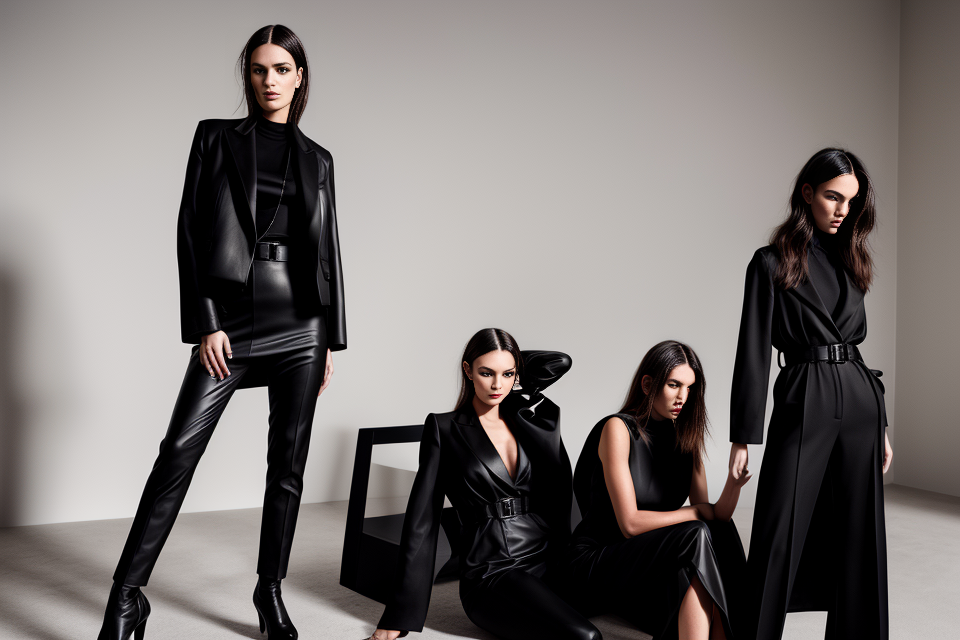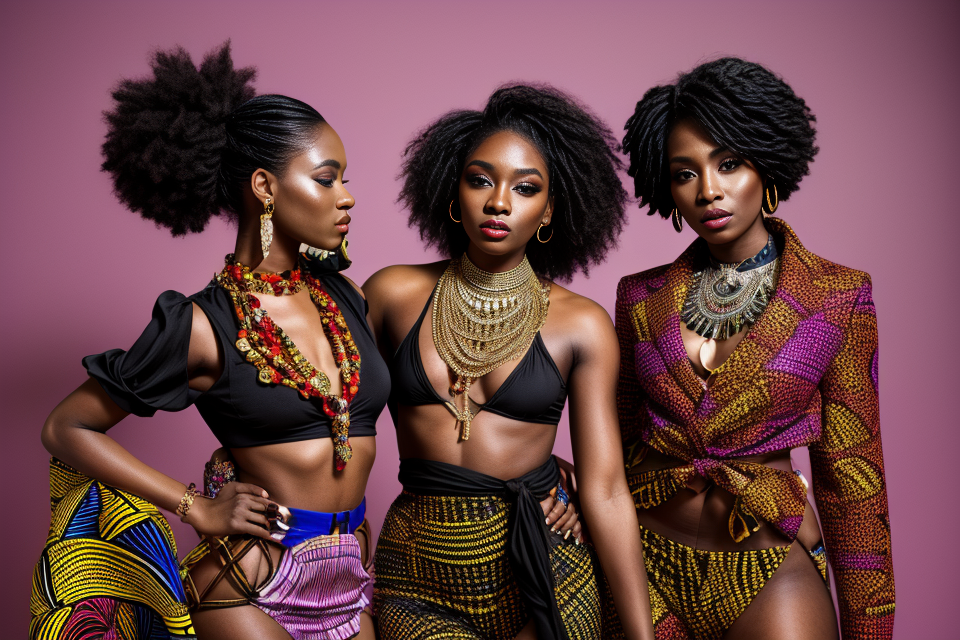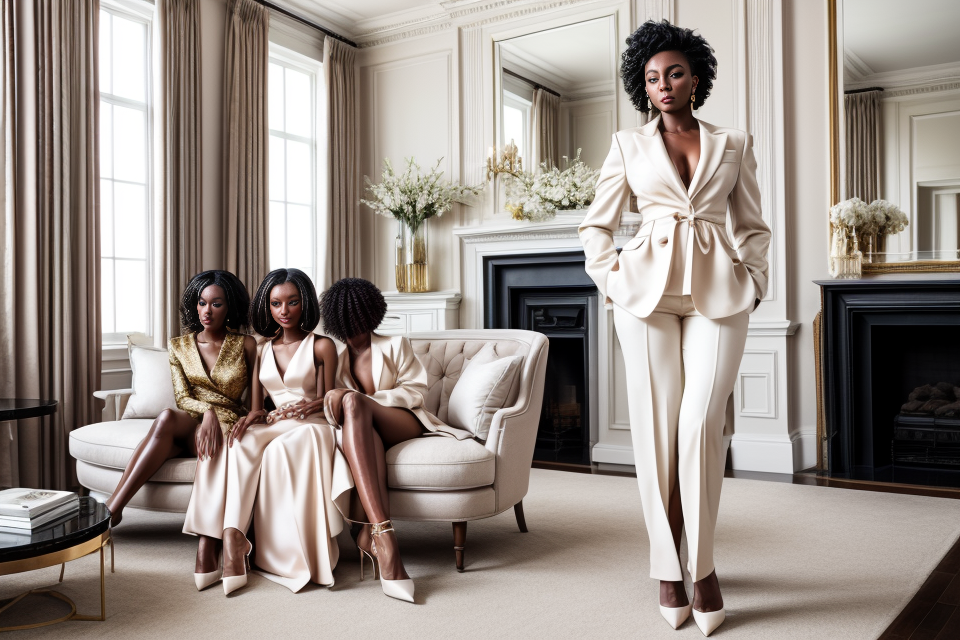Why is black the new popular choice in fashion? Well, for starters, it’s versatile. Black can be dressed up for a formal occasion or dressed down for a casual outing. It’s also a neutral color that can be paired with just about any other color, making it a go-to choice for many fashionistas. But there’s more to it than just versatility. Black has become a symbol of sophistication, edge, and even power. From the runway to the red carpet, black is the color of choice for many fashion-forward individuals. In this article, we’ll explore why black has become such a popular choice in fashion and how it has become a staple in many wardrobes. So, get ready to discover the secrets behind the power of black in fashion!
Black has become a popular choice in fashion for several reasons. One reason is that it is a versatile color that can be easily dressed up or down. Black can be paired with a variety of colors and patterns, making it a go-to choice for many fashion occasions. Additionally, black is a classic color that never goes out of style, which makes it a safe choice for those who want to invest in timeless pieces. Furthermore, black is a flattering color that can be worn by people of all skin tones, making it a universal choice. Lastly, black is often associated with sophistication and elegance, which may be why it has become a popular choice in formal wear and high-end fashion.
The Evolution of Black in Fashion
The Historic Significance of Black in Fashion
Black has been a staple color in fashion for centuries, with a rich and complex history that has shaped its current popularity. The following are some of the key moments in the historic significance of black in fashion:
The Roaring Twenties and Black Fashion
The Roaring Twenties, a time of cultural rebellion and experimentation, saw black become a popular color in fashion. This was due in part to the influence of the Jazz Age and the rise of black entertainers such as Josephine Baker, who popularized the use of black as a symbol of glamour and sophistication. The flapper dress, a iconic garment of the era, was often made of black fabric and was worn to showcase the wearer’s independence and modernity.
The Civil Rights Movement and Black Fashion
The Civil Rights Movement of the 1960s brought about a significant change in the way black was perceived in fashion. The movement, which sought to end racial segregation and discrimination, saw black become a symbol of resistance and solidarity. The use of black in clothing and accessories became a way for people to express their support for the cause and to challenge the status quo. This led to the rise of black-owned fashion businesses and the creation of new styles, such as the Afro-centric looks, that celebrated black culture and identity.
The Modern Era and Black Fashion
In recent years, black has become a popular choice in fashion once again, thanks in part to the influence of streetwear and urban style. The use of black in sportswear and athleisure has made it a go-to color for many people, while the rise of luxury brands such as Yves Saint Laurent and Balenciaga has made black a key color in high-end fashion. The popularity of black in fashion has also been fueled by the rise of social media, which has allowed people to share their style and inspire others to try new looks.
Overall, the historic significance of black in fashion is a testament to its versatility and timeless appeal. From the Roaring Twenties to the Civil Rights Movement to the modern era, black has been a color that has withstood the test of time and continues to be a popular choice for people looking to make a statement with their style.
The Influence of Celebrities and Social Media on Black Fashion
The Impact of Celebrities on Black Fashion
Celebrities have played a significant role in popularizing black fashion trends. With their massive social media following, celebrities have the power to influence millions of people around the world. Here are some ways in which celebrities have impacted black fashion:
The Rise of Black Celebrities as Fashion Icons
In recent years, black celebrities have become fashion icons, pushing the boundaries of traditional fashion and inspiring new trends. They have used their platforms to showcase black designers and to promote diversity and inclusivity in the fashion industry. For example, Rihanna, who is known for her bold and daring fashion choices, has been a vocal advocate for black designers and has helped to bring their work to a wider audience.
The Importance of Red Carpet Events and Fashion Week
Celebrities also play a crucial role in setting fashion trends through their appearances at red carpet events and fashion week. These events provide a platform for designers to showcase their latest collections, and celebrities are often the first to wear them. The outfits that celebrities wear on the red carpet and during fashion week are closely watched by fans and fashion enthusiasts around the world, and often set the tone for upcoming trends.
Furthermore, black celebrities have used their influence to push for greater representation and diversity in the fashion industry. By embracing black fashion and promoting black designers, they have helped to break down barriers and to create a more inclusive and diverse fashion culture.
Overall, the impact of celebrities on black fashion cannot be overstated. They have helped to push the boundaries of traditional fashion, to promote diversity and inclusivity, and to inspire new trends that have become popular among consumers.
The Role of Social Media in Popularizing Black Fashion
Social media has played a significant role in popularizing black fashion trends. Platforms such as Instagram, TikTok, and Twitter have provided a platform for individuals to share their style and connect with others who share similar interests.
The Growth of Instagram and Other Platforms
Instagram has been instrumental in promoting black fashion trends. With over one billion active users, it has become a hub for fashion influencers, designers, and enthusiasts to showcase their work and connect with a global audience. Other platforms such as Pinterest and YouTube have also played a significant role in promoting black fashion trends.
The Power of Hashtags and Influencers
Hashtags have been a powerful tool in promoting black fashion trends. The use of hashtags such as #BlackGirlMagic, #BlackFashionDesigners, and #SlayQueen has helped to create a community of individuals who share a passion for black fashion. Influencers have also played a significant role in promoting black fashion trends. They have used their platforms to showcase black designers and models, and to encourage their followers to adopt black fashion trends.
The power of social media has also allowed black fashion designers to showcase their work to a wider audience. Social media has provided a platform for black designers to reach a global audience and gain recognition for their work. This has helped to promote diversity and inclusivity in the fashion industry, and has given black designers a voice and a platform to showcase their work.
Overall, social media has played a significant role in popularizing black fashion trends. It has provided a platform for individuals to connect and share their style, and has helped to promote diversity and inclusivity in the fashion industry.
The Importance of Representation in Black Fashion
The Lack of Diversity in Fashion
The Eurocentric Approach in Fashion
The fashion industry has traditionally followed a Eurocentric approach, which has often led to a lack of diversity in the industry. This means that models, designers, and decision-makers in the fashion industry have typically been predominantly white, and the standards of beauty and fashion have been shaped by this perspective.
The Dominance of Light Skin Tones
One of the most significant aspects of the lack of diversity in fashion is the dominance of light skin tones. The fashion industry has long promoted a narrow definition of beauty that is associated with lighter skin tones, straighter hair, and Eurocentric features. This has resulted in people with darker skin tones feeling excluded and underrepresented in the fashion world.
The Invisibility of Black Fashion
Another issue that contributes to the lack of diversity in fashion is the invisibility of Black fashion. Black fashion has often been overlooked or dismissed, with designers and brands failing to recognize the unique style and fashion sense of Black individuals. This has led to a lack of representation and a limited understanding of the fashion preferences and needs of Black consumers.
The Need for Change
The lack of diversity in fashion has contributed to a culture that has historically marginalized and excluded people of color. The fashion industry has a responsibility to be more inclusive and to reflect the diverse perspectives and experiences of its consumers. This means creating a more diverse and representative environment in which people of all races and backgrounds can feel seen, heard, and valued.
In conclusion, the lack of diversity in fashion has been a significant issue that has contributed to the exclusion of Black individuals from the industry. By recognizing the importance of representation and creating a more inclusive environment, the fashion industry can begin to address this issue and become a more diverse and equitable space for all.
The Rise of Black Designers and Brands
The Importance of Supporting Black-Owned Businesses
- The fashion industry has historically been dominated by white designers and brands, leaving little room for representation of people of color.
- Supporting black-owned businesses in the fashion industry is crucial for creating a more inclusive and diverse environment.
- By choosing to shop from black-owned brands, consumers can actively support the growth and success of these businesses, which in turn helps to promote more diversity and representation in the fashion industry.
The Success of Black Designers in the Fashion Industry
- In recent years, there has been a notable increase in the success of black designers in the fashion industry.
- This success can be attributed to a number of factors, including increased visibility and representation in mainstream media, the rise of social media platforms that have provided black designers with a platform to showcase their work, and a growing consumer demand for more diversity and inclusivity in the fashion industry.
- Black designers such as Aurora James, creator of the Brother Vellies brand, and Kerby Jean-Raymond, founder of Pyer Moss, have gained recognition and accolades for their innovative designs and unique perspectives on fashion.
- The success of these designers is not only a testament to their talent and hard work, but also serves as an inspiration to other aspiring black designers and entrepreneurs in the fashion industry.
The Future of Black in Fashion
The Continued Evolution of Black Fashion
The Influence of Globalization and Diversity
As the world becomes increasingly interconnected, globalization continues to play a significant role in shaping the fashion industry. The exposure to different cultures and styles has encouraged designers to explore new colors, fabrics, and designs. In the context of black fashion, globalization has allowed for a broader representation of African and Afro-diasporic cultures, leading to a greater appreciation for the diversity of black culture and style.
The Future of Black Designers and Brands
The rise of black designers and brands in the fashion industry has been significant in recent years. The growing awareness of the importance of diversity and representation has led to a surge in demand for black-owned and designed fashion labels. As a result, more black designers are gaining recognition and establishing themselves in the industry.
Additionally, the continued evolution of black fashion is being driven by the success of black-owned businesses. These brands are not only breaking barriers and challenging the status quo but also creating a new standard for black fashion. With the support of consumers and the industry, black designers and brands are poised to shape the future of black fashion and contribute to its continued evolution.
The Importance of Sustainability and Ethical Fashion
The Growing Concerns about Fast Fashion and Environmental Impact
The fashion industry has long been criticized for its negative impact on the environment. Fast fashion, in particular, has been accused of contributing to pollution, waste, and exploitation of workers. As consumers become more aware of these issues, there is a growing demand for sustainable and ethical fashion.
The Rise of Slow Fashion and Ethical Brands
Slow fashion, which emphasizes quality over quantity and prioritizes sustainable practices, is gaining popularity among consumers who want to make a positive impact on the environment. Many ethical brands have emerged, offering clothing made from sustainable materials and produced in an environmentally and socially responsible manner. These brands often use organic cotton, recycled materials, and other eco-friendly fabrics, and they prioritize fair labor practices and transparency in their supply chains.
By choosing slow fashion and ethical brands, consumers can make a conscious decision to reduce their environmental impact and support brands that share their values. This shift towards sustainability and ethical fashion is likely to continue as more consumers become aware of the environmental and social costs of fast fashion.
The Opportunities for Black Fashion in the Future
The Growing Market for Black Fashion
In recent years, black fashion has experienced a surge in popularity, and this trend is expected to continue in the future. With the increasing demand for black fashion, there is a growing market for it, and this presents numerous opportunities for designers, retailers, and manufacturers. As the market for black fashion expands, there is a need for more designers and manufacturers who specialize in this area, and this presents an opportunity for entrepreneurs to start their own businesses.
The Potential for Black Fashion to Lead the Way in Sustainable and Ethical Fashion
Black fashion has the potential to lead the way in sustainable and ethical fashion. With the growing awareness of the impact of the fashion industry on the environment, consumers are becoming more conscious of the materials used in their clothing and the working conditions of the people who make their clothes. Black fashion can leverage this trend by using sustainable materials and ethical production practices. This can help to differentiate black fashion from other types of fashion and appeal to consumers who are looking for sustainable and ethical options. Additionally, black fashion can also play a role in promoting diversity and inclusivity in the fashion industry, by showcasing and celebrating the beauty and diversity of black culture.
FAQs
1. Why is black so popular in fashion?
Black has been a popular choice in fashion for a long time. One reason for its popularity is that it is a classic color that never goes out of style. It is also a versatile color that can be dressed up or down, making it suitable for a variety of occasions. Additionally, black is a flattering color that can make people appear thinner and more stylish.
2. Is black always a good choice for fashion?
While black is a popular choice in fashion, it may not always be the best choice for everyone. Depending on your skin tone and hair color, black may not be the most flattering color for you. It is important to consider your personal style and the occasion when choosing what to wear. If you are unsure, it is always a good idea to ask a trusted friend or fashion expert for their opinion.
3. Is black a formal color?
Black is often associated with formal wear, such as suits and evening gowns. However, it can also be worn casually, depending on the context. For example, a black t-shirt and jeans can be a comfortable and stylish outfit for everyday wear. In general, the formality of an outfit is determined by the context and the occasion, rather than the color of the clothing.
4. Is black a trendy color?
Black has been a trendy color in fashion for many years. It has been popular in different eras and styles, from the classic black tie look to the modern streetwear trend. While black may not be considered trendy in every context, it is generally considered a timeless and fashionable color.
5. Can black be worn with any other color?
Black can be worn with a variety of other colors, depending on the context and the look you are trying to achieve. For example, black can be paired with bright colors like red or yellow for a bold and striking look, or with more muted colors like gray or beige for a more subtle and sophisticated look. Ultimately, the key to styling black with other colors is to consider the overall look you are going for and to choose colors that complement rather than clash with black.



